Transforming a plain-vanilla pickup into a red-hot ride involves a multitude of decisions. But, we're not talking about the details of lifting or lowering, intakes or exhaust. No, what we're going to tackle is something far more challenging than bolting on a cat-back or installing subs. We're focusing on how you're going to pay for those cool upgrades.
Along the way, we'll cover the pros and cons of walking into a dealership and financing a new truck with all the fixin's, versus taking that same stock truck and going to a custom shop to add all the mods once you've driven off the dealer lot.
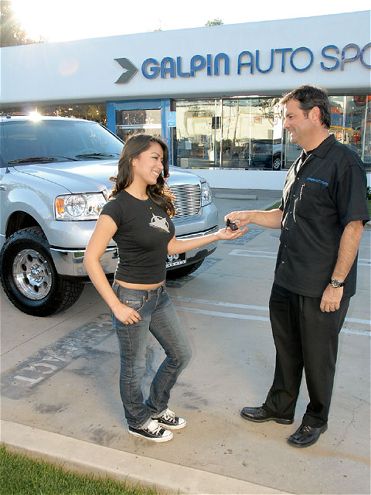
| custom Truck Financing buying Truck
How's your credit?Basically, the question we want to help you answer is: Should you finance cool? And what's the smartest way to do that? Related to that subject, we'll look at how aftermarket parts and customizing affect the vehicle warranty and insurance, as well.
To get to the bottom line, literally, of this subject, we spoke with a number of companies-owners of custom shops, experienced finance managers, and a large auto dealership with a special division set up just for customizing. Altogether, the comments and advice we heard were sometimes surprising, occasionally confusing, but generally helpful, assuming you can apply these general principles to your specific situation. And that's the key, because just as every custom sport truck differs, so do the financial circumstances of their owners.
Let's start with the typical scenario of taking a production pickup to a custom shop. While everybody knows cash is king, given the high dollar amounts often involved in a full-on sport truck, there are other, better ways to leverage the cost of a buildup with another asset.
"Most of our customers own real estate," explains Nick Vazquez of Norcal Truck in Livermore, California, which handles a lot of specialty suspension lifts-usually 6 to 10 inches in height, typically costing $7,000 to $16,000, including wheels and tires. "So they do either a cash-out refinance loan to pull money from the equity in their property, or in some cases, borrow against its value using a line of credit."
Not coincidentally, many of Norcal Truck's customers are into the real estate and mortgage loan business, along with sport trucks, and use profits from their investments to pay for their automotive passion. He says he's never had a customer use a bank loan but occasionally will charge the buildup on a credit card. However, he points out the Car Care card, a behind-the-scenes finance company that provides credit services for accessory shops, does not usually provide the level of funding required for his specialty builds.
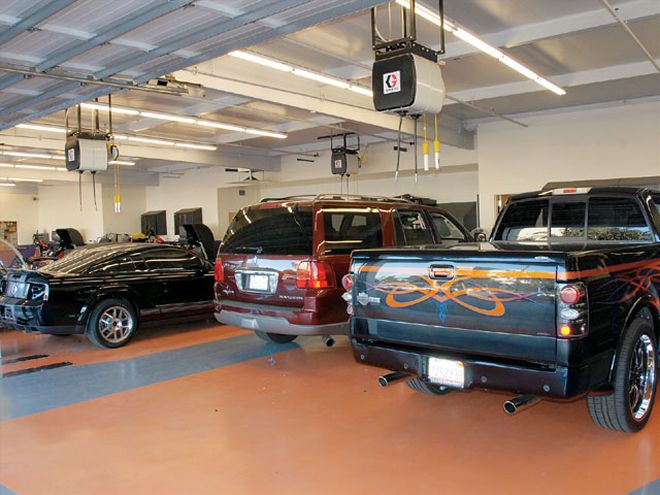
| Check out the massive install bays at GAS. We especially like the sweet Harley-Davidson Edition F-150 getting a custom makeover.
Using a credit card is more common situation with Cliff Leeper of Syndicate, which does a lot of custom chassis mods and four-link setups but not many bolt-on kits. He says the payment methods range widely, but most are done by credit card and, secondly, by cash. His advice? "A younger guy starting out on his first sport truck should buy a basic truck, then build it slowly over time," he says. "That way, he makes the right decisions and doesn't regret his purchases or go into heavy debt financing custom parts."
Getting back to the real estate method, drawing from your property's value to pay for personalizing a pickup may sound fairly simple, but there are several variations on that theme. To get a clearer picture, we checked with Todd Smith, a mortgage broker with Avrek Financial, who also happens to own a modified 1-ton Chevy that he uses at his biodiesel company, Xtreme Biodiesel. He recommends a particular type of equity loan:
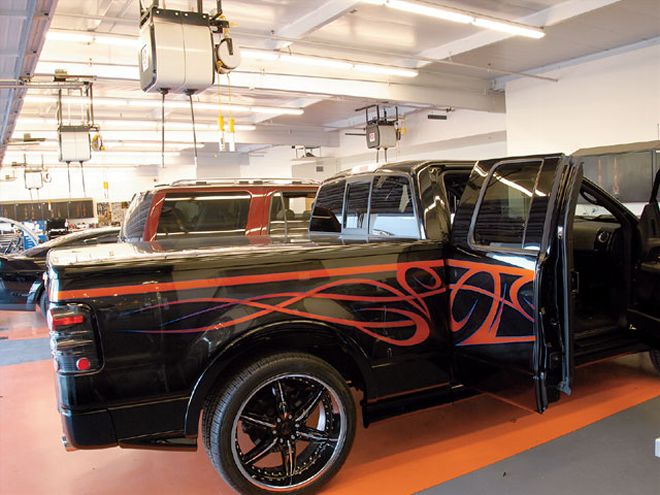
| custom Truck Financing custom Truck
"If your credit is in good standing, start with an option loan that's tied to the property," he says. "The advantage is that it frees up your cash flow with different payment plans that can be selected on a monthly basis, depending on how much money you want to set aside for the truck buildup. For instance, you can choose between a 30- or 15-year term, or you can even opt for an interest-only loan or minimum payment."
Be careful, here, though, because when you choose a smaller payment, you're not paying down on your principal, and it may actually increase the loan amount, which is tacked onto the back end. So, use the minimum payment option for only a short term.
Ok, so those are some approaches to consider when dealing with a custom shop. How about going the auto dealer route? Using its finance connections has some advantages, points out Steve McCloud, manager for Galpin Auto Sports (GAS). Located in Van Nuys, California, GAS is the customizing division of the largest Ford dealership in the U.S.
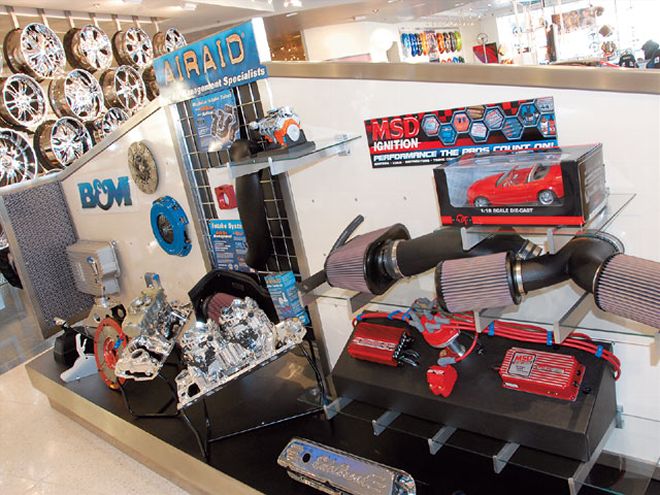
| Check out the "Wall of Wheels" behind the huge selection of performance parts.
"Since nearly all of the custom vehicles sold by GAS are financed to some degree, sometimes you can get lower loan rates or even interest-free financing," he says. That's basically because Galpin deals with a large number of financial vendors, so sources of funding are more flexible and varied, and can be tailored to the circumstances of the individual customer. That flexibility may be essential for certain types of customers, especially those who don't own real estate.
The idea of one-stop shopping for a custom sport truck might sound pretty straightforward, but some key aspects of F&I (Finance & Insurance) need to be covered, up front. First off, those two elements are lumped together because the bank needs to protect its loan or financial exposure with proper insurance coverage.
To get a clearer picture of the arcane F&I world, we spoke with an independent consultant, Mike Shales, a former auto finance manager/director and now a trainer for dealer finance departments. He provided some insider perspectives, along with some straightforward advice for prospective customers.
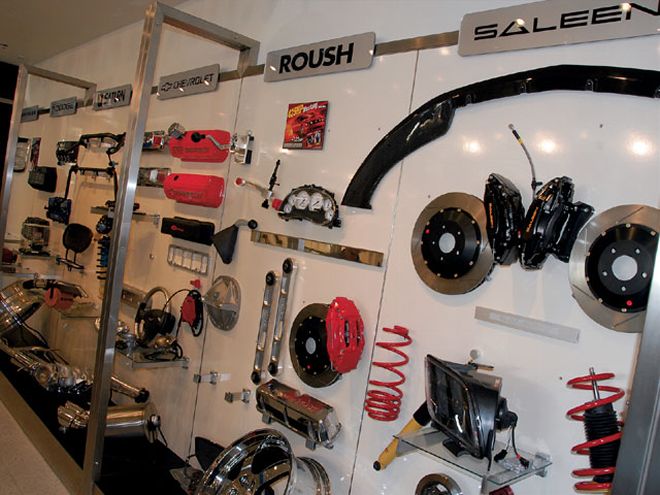
| Customers can look at different paint samples and choose a color scheme.
We asked him whether you should finance a cool sport truck in one big package, or are you're better off paying cash and building up your ride one piece at a time? As noted, related to this financial aspect is how these mods can affect your insurance. Perhaps most important to the customer, we found out just how much more you can end up paying for the upgrades if you roll them into the loan.
As with so many financial deals, the answer to all of these questions is maddeningly simple: It all depends. That is, it depends on your credit score, employment history, amount financed, size of down payment, and length of the loan.
Out of all the variables mentioned above, "The credit history is the most important," Shales says. "But, that has changed recently, since auto sales are generally down, and banks want to make the deal."
Typically, banks prefer a score of 650 and higher. However, he notes that last year the average credit score-also called a FICA number-was 702, but is now 672. Finding out beforehand how your own credit score stacks up is a useful piece of information in getting the best rate. One thing that can lower that score is a late payment for a house loan. Shales says that, "The banks will ask, 'If you can't pay for your house, how can you pay for your truck?'"

| From performance parts to custom paint, GAS has just about everything a potential customer is looking for when customizing a vehicle.
A lower credit score and a shorter history will likely mean a higher interest rate. Speaking of rates, what can you expect, and how much does interest add to the cost of a vehicle up-fit? As of this writing, rates usually range anywhere from 6 to 20 percent, typically with a term of four to six years. As already noted, though, some customizers, like GAS, may offer special rates for qualified customers.
Let's do the math on the highest rate, a worst-case scenario. Suppose you finance $5,000 worth of custom parts. How much will you end up paying over the life of the loan? At 20 percent, that's a payment of $20 per $1,000 borrowed each month.
So, on a $5,000 loan, you might pay $120/month (with additional service fees). That's $1,440 per year for five or more years. Even with paying down on the principal, the total of interest fees charged could add up to more than the initial price of the parts!
So, when considering a high-interest loan, "Make sure to obtain a good-faith estimate for the total expense you'd pay," advises Avrek's Todd Smith. "Take a hard look at the fine print and any junk fees that might be included. Do the math on what it's going to cost you in the long run for both interest and principal."
There's another important factor to consider when you finance a custom truck: "Some modifications will cancel out the warranty or extended service contract," Shales says. "It's a gray area, depending on the type of parts, but those authorized by the manufacturer are usually OK."
In general, Shales tells younger buyers of sport trucks to try to save up as much cash as possible, or build up the truck over time. He also recommends calling your insurance company beforehand to make sure what's covered under a policy. And to protect your investment, he says to make sure you take pictures and document any enhancements.
Hit The GasOf course, when it comes time to sportify your truck, going to a dealer's F&I department is not necessarily the first thing that comes to mind, partly because of the image of many parts departments-you know, the ones with a sleepy-eyed clerk behind the counter who struggles to figure out the difference between dubs and subs. That stereotype, however, is totally unlike what you will find at GAS, the customizing shop that handles those radical transformations featured on Pimp My Ride. If you haven't seen the show, rap superstar and car enthusiast Xzibit and car customization specialist Mad Mike take on some real clunkers, turning sows into silk. Joining them to put a new spin on vehicle customization is Beau Boeckmann of GAS.
To determine if it makes sense to rely on a dealer's aftermarket outlet, we spent some time at the new GAS facility, checking out the vehicles firsthand to cover the gamut of what the company does and to see how it differs from a low-volume custom operation.
Before GAS came into existence last spring, located at a former sofa store, right across the street from the dealership in Van Nuys, California, Galpin had a long history of customizing cars and trucks. The dealership, owned by Beau's dad, Bert, has been modifying vehicles for four full decades. It even invented the verb Galpinize to describe how it transforms cars. While not all of these one-off concepts have been big hits-and some have been a bit strange-the company takes credit for starting a number of automotive styling trends, such as van conversions and off-road accessories on four-wheel-drive pickups. He added winches, roll bars, foglights, and big wheels, among other items, stuff that seems routine in hindsight.
Today, Beau Boeckmann breaks down GAS vehicles into three basic menus: pre-packaged customs, customer-selected accessorization on a new vehicle, and those customers who bring in an older vehicle for modifications.
Starting with a pre-packaged custom, that may sound like an oxymoron, like jumbo shrimp, but he notes that, "We have two to three hundred vehicles on our lot that are already pre-customized."
As just one example, Boeckmann points to a row of Ford F-150 pickups, specially equipped for tailgate parties. The toys include a barbecue, a cooler, two beer taps, a satellite dish, a Sony PlayStation 2, and a big-screen television. Those extras can double the list price of the truck to about $70,000.
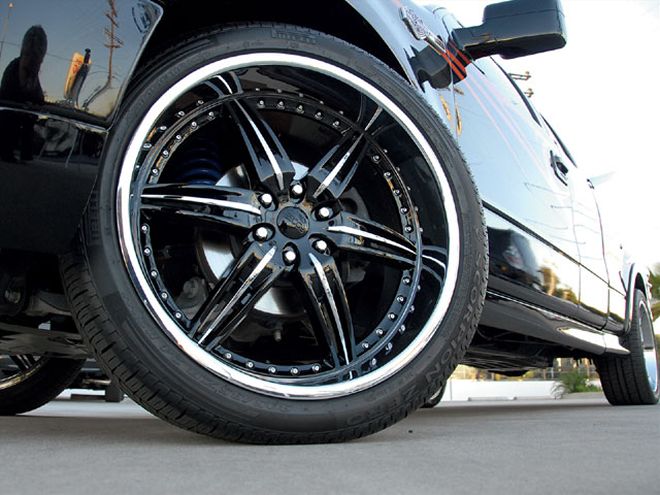
| custom Truck Financing custom Wheel
The dealership moves a staggering amount of iron every month, typically 300 to 500 vehicles, and roughly 25 percent of those are customized to some degree. And with these pre-customized pickups, there's no waiting, no fuss, and no muss. Also, you can usually finance the whole deal, assuming you have a decent credit history and can cough up a reasonable down payment. He's a bit vague about the loan details, since that varies with the profile of the customer, but a typical pre-customized pickup adds about $3,000 to $7,000 to the total purchase price.
Now on to Column B, the true custom category, at least from the standpoint of personalizing a pickup yourself. Here's where you can implement your own plan on a brand-new truck, with some customers adding as much as $50,000 or more worth of upgrades. The black Ford F-150 shown above is one such vehicle, loaded with ICE, a supercharger, custom paint and rims, and so on.
While GAS can do a lot of things to put more sport into your truck, it draws the line in certain areas: "We won't build any unsafe or illegal vehicles," Boeckmann says. "We'll lift the front 2 to 3 inches to level it out and add some fender flares." That's fairly mild in comparison to what most custom shops will do (recall the 10-inch lifts regularly handled by Norcal Truck), but then again, it doesn't necessarily offer the same low-interest financing deals.
As for lowering or airbags, that poses less of a problem, as long as no cutting of the framerails is involved. Minor body mods, such as a roll pan or shaving door handles, usually aren't an issue either.
Just don't look to GAS for a more radical lift. It's not because the company is trying to protect you from yourself. Rather, the finance and insurance companies want to make sure this investment is relatively secure. And handing over the keys for a tippy monster truck to a teenager hopped up on Rockstar doesn't exactly inspire confidence. All of which means that a GAS sport truck doesn't have to be dull, just not too risky.
Lastly, Column C consists of previous customers bringing their trucks back for an up-fit with their choice of aftermarket upgrades. As you might expect, "Galpin is built on volume [sales], along with repeat and referral business," Boeckmann points out. "Our real business comes from happy customers recommending us to friends and family," which means they often come back for more mods as their finances permit.
Whichever scenario you fall into, the layout of the GAS store, staffed by 35 employees, really has an impact as a one-stop customizers' paradise. Designed in part by Eddie Sotto, a Disney Imagineer, it has row after row of panels displaying every type of part, from brushguards to brakes, roof racks to racing rubber, and seats to superchargers. Intakes, exhausts, suspensions, upholstery, paint color chips-you want it, GAS has it.
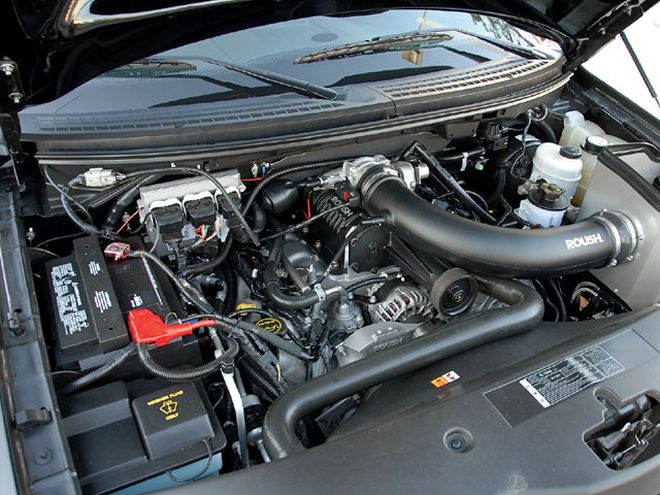
| custom Truck Financing custom Engine
Picking the right rims is obviously a key aspect of any sport truck, and that's why Sotto came up with the Wall of Wheels. "I'm especially proud of that display," Boeckmann says. And he should be, considering the glittering array of rims.
There's also a sound-system area, housed in an acoustic environment, allowing audiophiles to tune their ride's tunes, in addition to its performance. Enhancing the appeal of the store are general racks of apparel, DVDs, books, and other automotive accessories, so there's something for every level of enthusiast.
In sum, even though GAS is part of a huge dealership, it doesn't take a cookie-cutter approach. "I'll never forget something my cousin Steve McCloud said once," Boeckmann adds. "He told me, since opening, we haven't done the same thing twice," which is exactly what a competent customizer is all about, whether it's a small shop or a large dealership. And that also applies to financing the whole deal, which will likely require some custom touches, as well.
The Final WordSo, should you try to finance cool? Maybe. If you don't have the cash to pay for a new truck and you just have to have a set of dubs on it the day you roll off the dealer's lot, then financing the whole deal through the dealership might be for you. Just make sure the loan is something you can live with, and assume that you'll never get back what you pay for it, if you ever try to sell the truck.
Can you buy a cool sport truck from a new car dealer? Yes. But, if you want to have the baddest truck on the block, then you'll have to take ride to an independent custom shop that has no qualms about cutting into the frame to lay your truck flat on the ground, diving into the engine to build mucho horsepower, or lifting it to the sky. Remember, if it bolts on, then a dealership might be the way to go, but if your goals of automotive super-stardom are loftier than what bolt-on, smog-legal parts can achieve, then you'd better be ready to spend more coin and visit a custom shop.
 | custom Truck Financing buying Truck
How's your credit?
| custom Truck Financing buying Truck
How's your credit? | Check out the massive install bays at GAS. We especially like the sweet Harley-Davidson Edition F-150 getting a custom makeover.
Using a credit card is more common situation with Cliff Leeper of Syndicate, which does a lot of custom chassis mods and four-link setups but not many bolt-on kits. He says the payment methods range widely, but most are done by credit card and, secondly, by cash. His advice? "A younger guy starting out on his first sport truck should buy a basic truck, then build it slowly over time," he says. "That way, he makes the right decisions and doesn't regret his purchases or go into heavy debt financing custom parts."
Getting back to the real estate method, drawing from your property's value to pay for personalizing a pickup may sound fairly simple, but there are several variations on that theme. To get a clearer picture, we checked with Todd Smith, a mortgage broker with Avrek Financial, who also happens to own a modified 1-ton Chevy that he uses at his biodiesel company, Xtreme Biodiesel. He recommends a particular type of equity loan:
| Check out the massive install bays at GAS. We especially like the sweet Harley-Davidson Edition F-150 getting a custom makeover.
Using a credit card is more common situation with Cliff Leeper of Syndicate, which does a lot of custom chassis mods and four-link setups but not many bolt-on kits. He says the payment methods range widely, but most are done by credit card and, secondly, by cash. His advice? "A younger guy starting out on his first sport truck should buy a basic truck, then build it slowly over time," he says. "That way, he makes the right decisions and doesn't regret his purchases or go into heavy debt financing custom parts."
Getting back to the real estate method, drawing from your property's value to pay for personalizing a pickup may sound fairly simple, but there are several variations on that theme. To get a clearer picture, we checked with Todd Smith, a mortgage broker with Avrek Financial, who also happens to own a modified 1-ton Chevy that he uses at his biodiesel company, Xtreme Biodiesel. He recommends a particular type of equity loan:
 | custom Truck Financing custom Truck
"If your credit is in good standing, start with an option loan that's tied to the property," he says. "The advantage is that it frees up your cash flow with different payment plans that can be selected on a monthly basis, depending on how much money you want to set aside for the truck buildup. For instance, you can choose between a 30- or 15-year term, or you can even opt for an interest-only loan or minimum payment."
Be careful, here, though, because when you choose a smaller payment, you're not paying down on your principal, and it may actually increase the loan amount, which is tacked onto the back end. So, use the minimum payment option for only a short term.
Ok, so those are some approaches to consider when dealing with a custom shop. How about going the auto dealer route? Using its finance connections has some advantages, points out Steve McCloud, manager for Galpin Auto Sports (GAS). Located in Van Nuys, California, GAS is the customizing division of the largest Ford dealership in the U.S.
| custom Truck Financing custom Truck
"If your credit is in good standing, start with an option loan that's tied to the property," he says. "The advantage is that it frees up your cash flow with different payment plans that can be selected on a monthly basis, depending on how much money you want to set aside for the truck buildup. For instance, you can choose between a 30- or 15-year term, or you can even opt for an interest-only loan or minimum payment."
Be careful, here, though, because when you choose a smaller payment, you're not paying down on your principal, and it may actually increase the loan amount, which is tacked onto the back end. So, use the minimum payment option for only a short term.
Ok, so those are some approaches to consider when dealing with a custom shop. How about going the auto dealer route? Using its finance connections has some advantages, points out Steve McCloud, manager for Galpin Auto Sports (GAS). Located in Van Nuys, California, GAS is the customizing division of the largest Ford dealership in the U.S.
 | Check out the "Wall of Wheels" behind the huge selection of performance parts.
"Since nearly all of the custom vehicles sold by GAS are financed to some degree, sometimes you can get lower loan rates or even interest-free financing," he says. That's basically because Galpin deals with a large number of financial vendors, so sources of funding are more flexible and varied, and can be tailored to the circumstances of the individual customer. That flexibility may be essential for certain types of customers, especially those who don't own real estate.
The idea of one-stop shopping for a custom sport truck might sound pretty straightforward, but some key aspects of F&I (Finance & Insurance) need to be covered, up front. First off, those two elements are lumped together because the bank needs to protect its loan or financial exposure with proper insurance coverage.
To get a clearer picture of the arcane F&I world, we spoke with an independent consultant, Mike Shales, a former auto finance manager/director and now a trainer for dealer finance departments. He provided some insider perspectives, along with some straightforward advice for prospective customers.
| Check out the "Wall of Wheels" behind the huge selection of performance parts.
"Since nearly all of the custom vehicles sold by GAS are financed to some degree, sometimes you can get lower loan rates or even interest-free financing," he says. That's basically because Galpin deals with a large number of financial vendors, so sources of funding are more flexible and varied, and can be tailored to the circumstances of the individual customer. That flexibility may be essential for certain types of customers, especially those who don't own real estate.
The idea of one-stop shopping for a custom sport truck might sound pretty straightforward, but some key aspects of F&I (Finance & Insurance) need to be covered, up front. First off, those two elements are lumped together because the bank needs to protect its loan or financial exposure with proper insurance coverage.
To get a clearer picture of the arcane F&I world, we spoke with an independent consultant, Mike Shales, a former auto finance manager/director and now a trainer for dealer finance departments. He provided some insider perspectives, along with some straightforward advice for prospective customers.
 | Customers can look at different paint samples and choose a color scheme.
We asked him whether you should finance a cool sport truck in one big package, or are you're better off paying cash and building up your ride one piece at a time? As noted, related to this financial aspect is how these mods can affect your insurance. Perhaps most important to the customer, we found out just how much more you can end up paying for the upgrades if you roll them into the loan.
As with so many financial deals, the answer to all of these questions is maddeningly simple: It all depends. That is, it depends on your credit score, employment history, amount financed, size of down payment, and length of the loan.
Out of all the variables mentioned above, "The credit history is the most important," Shales says. "But, that has changed recently, since auto sales are generally down, and banks want to make the deal."
Typically, banks prefer a score of 650 and higher. However, he notes that last year the average credit score-also called a FICA number-was 702, but is now 672. Finding out beforehand how your own credit score stacks up is a useful piece of information in getting the best rate. One thing that can lower that score is a late payment for a house loan. Shales says that, "The banks will ask, 'If you can't pay for your house, how can you pay for your truck?'"
| Customers can look at different paint samples and choose a color scheme.
We asked him whether you should finance a cool sport truck in one big package, or are you're better off paying cash and building up your ride one piece at a time? As noted, related to this financial aspect is how these mods can affect your insurance. Perhaps most important to the customer, we found out just how much more you can end up paying for the upgrades if you roll them into the loan.
As with so many financial deals, the answer to all of these questions is maddeningly simple: It all depends. That is, it depends on your credit score, employment history, amount financed, size of down payment, and length of the loan.
Out of all the variables mentioned above, "The credit history is the most important," Shales says. "But, that has changed recently, since auto sales are generally down, and banks want to make the deal."
Typically, banks prefer a score of 650 and higher. However, he notes that last year the average credit score-also called a FICA number-was 702, but is now 672. Finding out beforehand how your own credit score stacks up is a useful piece of information in getting the best rate. One thing that can lower that score is a late payment for a house loan. Shales says that, "The banks will ask, 'If you can't pay for your house, how can you pay for your truck?'"
 | From performance parts to custom paint, GAS has just about everything a potential customer is looking for when customizing a vehicle.
A lower credit score and a shorter history will likely mean a higher interest rate. Speaking of rates, what can you expect, and how much does interest add to the cost of a vehicle up-fit? As of this writing, rates usually range anywhere from 6 to 20 percent, typically with a term of four to six years. As already noted, though, some customizers, like GAS, may offer special rates for qualified customers.
Let's do the math on the highest rate, a worst-case scenario. Suppose you finance $5,000 worth of custom parts. How much will you end up paying over the life of the loan? At 20 percent, that's a payment of $20 per $1,000 borrowed each month.
So, on a $5,000 loan, you might pay $120/month (with additional service fees). That's $1,440 per year for five or more years. Even with paying down on the principal, the total of interest fees charged could add up to more than the initial price of the parts!
So, when considering a high-interest loan, "Make sure to obtain a good-faith estimate for the total expense you'd pay," advises Avrek's Todd Smith. "Take a hard look at the fine print and any junk fees that might be included. Do the math on what it's going to cost you in the long run for both interest and principal."
There's another important factor to consider when you finance a custom truck: "Some modifications will cancel out the warranty or extended service contract," Shales says. "It's a gray area, depending on the type of parts, but those authorized by the manufacturer are usually OK."
In general, Shales tells younger buyers of sport trucks to try to save up as much cash as possible, or build up the truck over time. He also recommends calling your insurance company beforehand to make sure what's covered under a policy. And to protect your investment, he says to make sure you take pictures and document any enhancements.
Hit The Gas
| From performance parts to custom paint, GAS has just about everything a potential customer is looking for when customizing a vehicle.
A lower credit score and a shorter history will likely mean a higher interest rate. Speaking of rates, what can you expect, and how much does interest add to the cost of a vehicle up-fit? As of this writing, rates usually range anywhere from 6 to 20 percent, typically with a term of four to six years. As already noted, though, some customizers, like GAS, may offer special rates for qualified customers.
Let's do the math on the highest rate, a worst-case scenario. Suppose you finance $5,000 worth of custom parts. How much will you end up paying over the life of the loan? At 20 percent, that's a payment of $20 per $1,000 borrowed each month.
So, on a $5,000 loan, you might pay $120/month (with additional service fees). That's $1,440 per year for five or more years. Even with paying down on the principal, the total of interest fees charged could add up to more than the initial price of the parts!
So, when considering a high-interest loan, "Make sure to obtain a good-faith estimate for the total expense you'd pay," advises Avrek's Todd Smith. "Take a hard look at the fine print and any junk fees that might be included. Do the math on what it's going to cost you in the long run for both interest and principal."
There's another important factor to consider when you finance a custom truck: "Some modifications will cancel out the warranty or extended service contract," Shales says. "It's a gray area, depending on the type of parts, but those authorized by the manufacturer are usually OK."
In general, Shales tells younger buyers of sport trucks to try to save up as much cash as possible, or build up the truck over time. He also recommends calling your insurance company beforehand to make sure what's covered under a policy. And to protect your investment, he says to make sure you take pictures and document any enhancements.
Hit The Gas | custom Truck Financing custom Wheel
The dealership moves a staggering amount of iron every month, typically 300 to 500 vehicles, and roughly 25 percent of those are customized to some degree. And with these pre-customized pickups, there's no waiting, no fuss, and no muss. Also, you can usually finance the whole deal, assuming you have a decent credit history and can cough up a reasonable down payment. He's a bit vague about the loan details, since that varies with the profile of the customer, but a typical pre-customized pickup adds about $3,000 to $7,000 to the total purchase price.
Now on to Column B, the true custom category, at least from the standpoint of personalizing a pickup yourself. Here's where you can implement your own plan on a brand-new truck, with some customers adding as much as $50,000 or more worth of upgrades. The black Ford F-150 shown above is one such vehicle, loaded with ICE, a supercharger, custom paint and rims, and so on.
While GAS can do a lot of things to put more sport into your truck, it draws the line in certain areas: "We won't build any unsafe or illegal vehicles," Boeckmann says. "We'll lift the front 2 to 3 inches to level it out and add some fender flares." That's fairly mild in comparison to what most custom shops will do (recall the 10-inch lifts regularly handled by Norcal Truck), but then again, it doesn't necessarily offer the same low-interest financing deals.
As for lowering or airbags, that poses less of a problem, as long as no cutting of the framerails is involved. Minor body mods, such as a roll pan or shaving door handles, usually aren't an issue either.
Just don't look to GAS for a more radical lift. It's not because the company is trying to protect you from yourself. Rather, the finance and insurance companies want to make sure this investment is relatively secure. And handing over the keys for a tippy monster truck to a teenager hopped up on Rockstar doesn't exactly inspire confidence. All of which means that a GAS sport truck doesn't have to be dull, just not too risky.
Lastly, Column C consists of previous customers bringing their trucks back for an up-fit with their choice of aftermarket upgrades. As you might expect, "Galpin is built on volume [sales], along with repeat and referral business," Boeckmann points out. "Our real business comes from happy customers recommending us to friends and family," which means they often come back for more mods as their finances permit.
Whichever scenario you fall into, the layout of the GAS store, staffed by 35 employees, really has an impact as a one-stop customizers' paradise. Designed in part by Eddie Sotto, a Disney Imagineer, it has row after row of panels displaying every type of part, from brushguards to brakes, roof racks to racing rubber, and seats to superchargers. Intakes, exhausts, suspensions, upholstery, paint color chips-you want it, GAS has it.
| custom Truck Financing custom Wheel
The dealership moves a staggering amount of iron every month, typically 300 to 500 vehicles, and roughly 25 percent of those are customized to some degree. And with these pre-customized pickups, there's no waiting, no fuss, and no muss. Also, you can usually finance the whole deal, assuming you have a decent credit history and can cough up a reasonable down payment. He's a bit vague about the loan details, since that varies with the profile of the customer, but a typical pre-customized pickup adds about $3,000 to $7,000 to the total purchase price.
Now on to Column B, the true custom category, at least from the standpoint of personalizing a pickup yourself. Here's where you can implement your own plan on a brand-new truck, with some customers adding as much as $50,000 or more worth of upgrades. The black Ford F-150 shown above is one such vehicle, loaded with ICE, a supercharger, custom paint and rims, and so on.
While GAS can do a lot of things to put more sport into your truck, it draws the line in certain areas: "We won't build any unsafe or illegal vehicles," Boeckmann says. "We'll lift the front 2 to 3 inches to level it out and add some fender flares." That's fairly mild in comparison to what most custom shops will do (recall the 10-inch lifts regularly handled by Norcal Truck), but then again, it doesn't necessarily offer the same low-interest financing deals.
As for lowering or airbags, that poses less of a problem, as long as no cutting of the framerails is involved. Minor body mods, such as a roll pan or shaving door handles, usually aren't an issue either.
Just don't look to GAS for a more radical lift. It's not because the company is trying to protect you from yourself. Rather, the finance and insurance companies want to make sure this investment is relatively secure. And handing over the keys for a tippy monster truck to a teenager hopped up on Rockstar doesn't exactly inspire confidence. All of which means that a GAS sport truck doesn't have to be dull, just not too risky.
Lastly, Column C consists of previous customers bringing their trucks back for an up-fit with their choice of aftermarket upgrades. As you might expect, "Galpin is built on volume [sales], along with repeat and referral business," Boeckmann points out. "Our real business comes from happy customers recommending us to friends and family," which means they often come back for more mods as their finances permit.
Whichever scenario you fall into, the layout of the GAS store, staffed by 35 employees, really has an impact as a one-stop customizers' paradise. Designed in part by Eddie Sotto, a Disney Imagineer, it has row after row of panels displaying every type of part, from brushguards to brakes, roof racks to racing rubber, and seats to superchargers. Intakes, exhausts, suspensions, upholstery, paint color chips-you want it, GAS has it.
 | custom Truck Financing custom Engine
Picking the right rims is obviously a key aspect of any sport truck, and that's why Sotto came up with the Wall of Wheels. "I'm especially proud of that display," Boeckmann says. And he should be, considering the glittering array of rims.
There's also a sound-system area, housed in an acoustic environment, allowing audiophiles to tune their ride's tunes, in addition to its performance. Enhancing the appeal of the store are general racks of apparel, DVDs, books, and other automotive accessories, so there's something for every level of enthusiast.
In sum, even though GAS is part of a huge dealership, it doesn't take a cookie-cutter approach. "I'll never forget something my cousin Steve McCloud said once," Boeckmann adds. "He told me, since opening, we haven't done the same thing twice," which is exactly what a competent customizer is all about, whether it's a small shop or a large dealership. And that also applies to financing the whole deal, which will likely require some custom touches, as well.
The Final Word
| custom Truck Financing custom Engine
Picking the right rims is obviously a key aspect of any sport truck, and that's why Sotto came up with the Wall of Wheels. "I'm especially proud of that display," Boeckmann says. And he should be, considering the glittering array of rims.
There's also a sound-system area, housed in an acoustic environment, allowing audiophiles to tune their ride's tunes, in addition to its performance. Enhancing the appeal of the store are general racks of apparel, DVDs, books, and other automotive accessories, so there's something for every level of enthusiast.
In sum, even though GAS is part of a huge dealership, it doesn't take a cookie-cutter approach. "I'll never forget something my cousin Steve McCloud said once," Boeckmann adds. "He told me, since opening, we haven't done the same thing twice," which is exactly what a competent customizer is all about, whether it's a small shop or a large dealership. And that also applies to financing the whole deal, which will likely require some custom touches, as well.
The Final Word